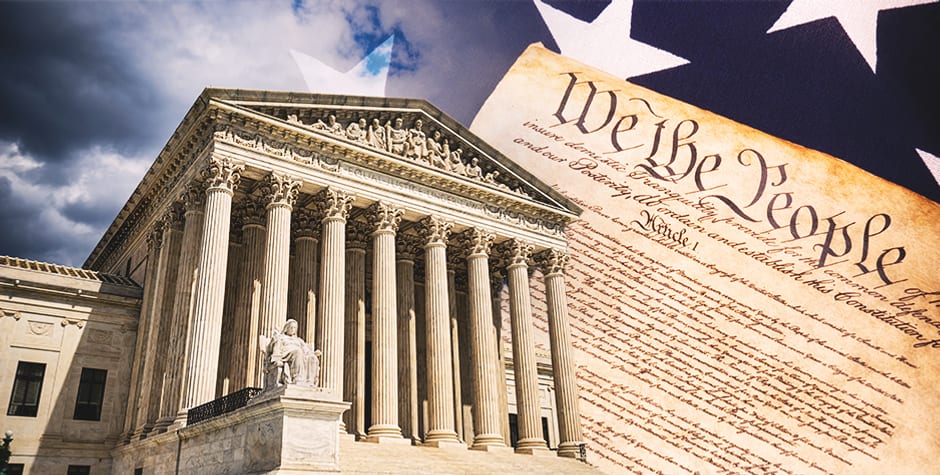ACLJ at the Supreme Court: Democrats Seek To Silence With Outdated Precedent
Listen tothis article
Once again, the First Amendment is under attack – and it’s the Democrat Party leading the charge. This time, the attack utilizes outdated campaign finance restrictions that muzzle political parties from fully supporting their candidates. The twist? Even the Federal Election Commission (FEC) – the very agency charged with enforcing these rules – has refused to defend the archaic policy. The FEC has declined to defend this appeal at the Supreme Court, implicitly recognizing that the First Amendment leaves no room for laws that gag political parties.
But the Democrats couldn’t leave it there. The Democratic National Committee (DNC) has stepped in to do what the government itself will not: argue for preserving restrictions on political speech. In other words, while the federal government has accepted the Constitution’s limits, the Democrats are protesting all the way to the Supreme Court, filing a Motion to Intervene.
At the ACLJ, we know what’s really at stake. This isn’t just about technical campaign finance rules. It’s about whether the government – and now one political party – can rig the rules of public debate by silencing disfavored voices. If one side of the political aisle can use outdated precedent to hamstring its opponents, then our democracy suffers, and free speech is nothing more than a slogan.
Now is the time to use your voice to defend our Constitution. Add your name to our petition: Restore the Constitution. Don’t Shred It.
This FEC action stems from the 2022 campaigns of then-Senator JD Vance and Rep. Steve Chabot (1) of Ohio, who brought challenges to overly narrow and technical campaign finance restrictions. The path to these restrictions dates back to 2001, when the Supreme Court upheld them.
But since then, the Supreme Court has consistently “recognized only one permissible ground for restricting political speech: the prevention of ‘quid pro quo’ corruption or its appearance.” Otherwise, the First Amendment protects candidates’ ability to use campaign funds according to their campaign strategy. Case after case has reaffirmed that the only permissible justification for restricting political speech is preventing actual bribery or its appearance. The Court has expressly rejected broader rationales like “leveling the playing field” or “reducing influence.”
In short, these restrictions no longer fit the First Amendment landscape. Even the Sixth Circuit admitted as much. But instead of applying the Supreme Court’s modern precedents, the lower court said its hands were tied until the Supreme Court was clearer about abandoning prior precedent. That’s judicial paralysis. That’s also why our role at the ACLJ is unique. While the Republican National Committee is arguing the merits of why party expenditures are protected, our amicus brief takes on the deeper problem: the misuse of stare decisis.
For too long, lower courts have hidden behind a flawed doctrine that says they must follow Supreme Court cases until expressly overruled – even when the Court has clearly abandoned the doctrine’s reasoning. This idea keeps bad precedent alive far longer than the Constitution permits.
Our brief urges the Court to correct this. The Supreme Court doesn’t need to say “magic words” to overrule itself. When the Court has consistently rejected an earlier decision’s reasoning, that precedent is gone – overruled implicitly, but decisively. Lower courts must recognize that reality. Otherwise, they are not honoring the Court’s authority but defying it.
Therefore, this case is about more than one campaign finance rule. It is about whether courts will give the First Amendment the force the Supreme Court has demanded, or whether they will continue applying obsolete decisions at the urging of partisan litigants.
And make no mistake: The partisanship here is striking. The FEC bowed out, recognizing constitutional reality. The DNC charged in, desperate to preserve rules that keep its opponents quiet. It’s a picture of one party weaponizing bad precedent against another, while the people’s right to robust political debate hangs in the balance.
At the ACLJ, we are standing in the gap. Our unique contribution ensures that the Court is not only confronted with the First Amendment principles at stake, but also with the urgent need to clarify how lower courts must handle precedent. If the Court does not rein in this misuse of stare decisis, free speech will remain vulnerable to judicial evasion.
We have fought these battles for 35 years, and we will continue to do so. Because at the end of the day, this case is not just about Republicans or Democrats. It’s about ensuring that the First Amendment belongs to the people – not the government, and not to a political party bent on silencing its opponents.
The Supreme Court will hear arguments this fall. We will be there, pressing for clarity, pressing for constitutional fidelity, and pressing for your rights. And we will keep fighting until free speech is secured for every American. Add your name to our petition: Restore the Constitution. Don’t Shred it.
